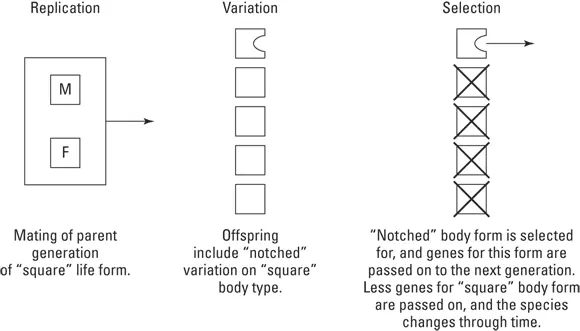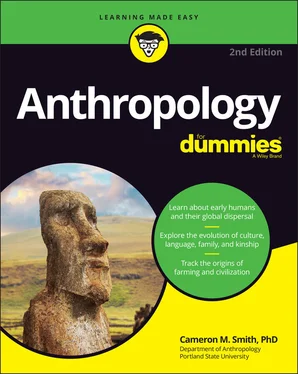Replication, variation, and selection
 Until the mid-1800s, many questions about the human species, the age of the Earth, and other basic inquiries were answered by looking to one document: the Christian Bible. People argued that it contained all the answers humans would ever need, so no further investigation was necessary. The age of the Earth? An Irish archbishop calculated it as about 6,000 years, based on biblical chronologies. The origins of humanity? Clearly laid out in the first pages of Genesis: God created humanity in a moment of divine inspiration. Whatever one thinks of the morality prescribed by the Bible (and plenty of scientists use its messages as guides to their moral life), it’s clear today that these so-called facts are simply incorrect, dating from an age in which little was empirically known about the age of the Earth, the origins of humanity, or even that our own planet wasn’t at the center of the universe, but only one of many. For science, the interpretation of the universe could not proceed just as interpretations of biblical passages. New ways to investigate the world had to be invented. And one of the things they discovered was the evolutionary process.
Until the mid-1800s, many questions about the human species, the age of the Earth, and other basic inquiries were answered by looking to one document: the Christian Bible. People argued that it contained all the answers humans would ever need, so no further investigation was necessary. The age of the Earth? An Irish archbishop calculated it as about 6,000 years, based on biblical chronologies. The origins of humanity? Clearly laid out in the first pages of Genesis: God created humanity in a moment of divine inspiration. Whatever one thinks of the morality prescribed by the Bible (and plenty of scientists use its messages as guides to their moral life), it’s clear today that these so-called facts are simply incorrect, dating from an age in which little was empirically known about the age of the Earth, the origins of humanity, or even that our own planet wasn’t at the center of the universe, but only one of many. For science, the interpretation of the universe could not proceed just as interpretations of biblical passages. New ways to investigate the world had to be invented. And one of the things they discovered was the evolutionary process.
Yes, the evolutionary process. Evolution is process, not a thing. In fact, it’s a single word used to describe the cumulative effects of three independent facts. Importantly, these attributes of evolution can be (and are) observed in nature, and the laboratory, every day. They are
Replication: The fact that life forms have offspring
Variation: The fact that each offspring is slightly different from its parents and siblings
Selection: The fact that not all offspring survive, and those that do tend to be the ones best suited to their environment
Figure 3-2 shows these characteristics in more detail.

Illustration courtesy of Cameron M. Smith, PhD
FIGURE 3-2:Evolution as the result of replication, variation, and selection.
 Regardless of your personal views on the topic of evolution, the three processes of evolution aren’t arguable. Whether it’s in the form of zebra calves, salmon fry, or human infants, life forms replicate. Also, all offspring aren’t clones; variation occurs in small ways and significant ways, but it occurs. And if it weren’t for selection, the world would be swarming with every mosquito, beetle, and tadpole ever born; the fact that it isn’t verifies that not all of these creatures born survive into adulthood. Finally, it’s not arguable that the offspring best suited to their environment tend to pass their genes on to the next generation. And it is simply the cumulative effect of these processes that we call evolution.
Regardless of your personal views on the topic of evolution, the three processes of evolution aren’t arguable. Whether it’s in the form of zebra calves, salmon fry, or human infants, life forms replicate. Also, all offspring aren’t clones; variation occurs in small ways and significant ways, but it occurs. And if it weren’t for selection, the world would be swarming with every mosquito, beetle, and tadpole ever born; the fact that it isn’t verifies that not all of these creatures born survive into adulthood. Finally, it’s not arguable that the offspring best suited to their environment tend to pass their genes on to the next generation. And it is simply the cumulative effect of these processes that we call evolution.
When replication happens, the variable offspring are born into an environment that basically either selects for or against them; if two dragonflies are pursued by predators (like birds), the one with a better build for its environment is most likely to survive. It’s been selected for rather than against, and it’s therefore more likely than its less-fit sibling to pass on the genes that made it. Now the genes that made a fit dragonfly go on to make the next generation of dragonflies, which are slightly fitter than the parent generation. Essentially, that’s evolution: selection acting on the variable offspring, leading to the change through time of the characteristics of the organism.
 It is the genes that direct the building of the life form that are passed on in the genetic code of sperm and egg cells. The whole body, of course, is not transmitted, but the instructions for building it are (in the incredible DNA molecule).
It is the genes that direct the building of the life form that are passed on in the genetic code of sperm and egg cells. The whole body, of course, is not transmitted, but the instructions for building it are (in the incredible DNA molecule).
Keep in mind that the term selection implies that someone is making a decision, or selecting. But really, it just refers to the survival probability of a given life form. One way to think of selection with less implication of a deliberate “selector” is in the phrase “the organism proposes, the environment disposes.”
 Groups of living things that can interbreed and have healthy offspring are called members of a single species . Groups of similar species diverge into further groups, forming a biological classification hierarchy that I discuss in Chapter 4. In this chapter, just remember that a genus is the level above species. Humanity is in the genus Homo and the species sapiens , yielding the scientific name Homo sapiens .
Groups of living things that can interbreed and have healthy offspring are called members of a single species . Groups of similar species diverge into further groups, forming a biological classification hierarchy that I discuss in Chapter 4. In this chapter, just remember that a genus is the level above species. Humanity is in the genus Homo and the species sapiens , yielding the scientific name Homo sapiens .
Sometimes groups of living things move from one environment to another, as when air currents carry insects to a distant island, or some subpopulation of a species of squirrel somehow crosses a river and is cut off from its original population. When this happens, new selective pressures (different temperatures, say, in the new region) may reshape the population so much that if it were to rejoin its ancestral population, the two couldn’t interbreed. This event is called speciation , and it’s what most people think of when they think about evolution: one life form gradually changing into another.
Because speciation can take a long time (anywhere from thousands to millions of years), it’s hard to observe. Still, you can see it in the fossil record, where billions of years of Earth life have left traces of their change through time. And that record speaks clearly, even though it has gaps here and there (because geological forces have wiped out some fossils, for example, or animal and plant remains simply didn’t fossilize due to geochemical factors). All of this tells anthropologists that yes, all living species have long evolutionary histories, including Homo sapiens and all its living and past relatives in the primate order. This is where physical anthropology comes in, to investigate that evolutionary past.
WHY BEING HUMAN CAN MAKE EVOLUTION HARD TO UNDERSTAND
Although the world of biology widely accepts evolution, the topic can be hard to understand for several reasons. Leaving aside deliberate mischaracterization of evolution by those with a religious agenda, I’m talking about how being human itself obscures our view of evolution.
By this I mean that although humans evolve, we do so in some ways profoundly different from other species. For the last 100,000 years our outward, physical bodies haven’t evolved too terribly much; modern human skeletons are essentially indistinguishable from those of 100,000 years ago. And yet humanity has changed a great deal; most of us now live in massive cities, instead of as highly mobile foragers, and most of us eat foods grown on farms rather than hunted and collected from across vast landscapes. So what has changed, and how does it make evolution hard to understand?
What have changed are our minds and the cultures we carry in them. Culture, really, is the mind’s set of instructions for what the universe is like and what you’re supposed to do about it. (You can read about culture in more detail in Chapter 11.) Doing is the crux: We humans evolve proactively, inventing artifacts and cultural practices to survive in new environments, not re actively like every other species. Other species don’t even know they’re evolving through time. Consider the Arctic, which was widely colonized after about 1,500 years ago by people who invented dog sleds, whale-hunting equipment, watercraft, and the snow-house or iglu.
Читать дальше

 Until the mid-1800s, many questions about the human species, the age of the Earth, and other basic inquiries were answered by looking to one document: the Christian Bible. People argued that it contained all the answers humans would ever need, so no further investigation was necessary. The age of the Earth? An Irish archbishop calculated it as about 6,000 years, based on biblical chronologies. The origins of humanity? Clearly laid out in the first pages of Genesis: God created humanity in a moment of divine inspiration. Whatever one thinks of the morality prescribed by the Bible (and plenty of scientists use its messages as guides to their moral life), it’s clear today that these so-called facts are simply incorrect, dating from an age in which little was empirically known about the age of the Earth, the origins of humanity, or even that our own planet wasn’t at the center of the universe, but only one of many. For science, the interpretation of the universe could not proceed just as interpretations of biblical passages. New ways to investigate the world had to be invented. And one of the things they discovered was the evolutionary process.
Until the mid-1800s, many questions about the human species, the age of the Earth, and other basic inquiries were answered by looking to one document: the Christian Bible. People argued that it contained all the answers humans would ever need, so no further investigation was necessary. The age of the Earth? An Irish archbishop calculated it as about 6,000 years, based on biblical chronologies. The origins of humanity? Clearly laid out in the first pages of Genesis: God created humanity in a moment of divine inspiration. Whatever one thinks of the morality prescribed by the Bible (and plenty of scientists use its messages as guides to their moral life), it’s clear today that these so-called facts are simply incorrect, dating from an age in which little was empirically known about the age of the Earth, the origins of humanity, or even that our own planet wasn’t at the center of the universe, but only one of many. For science, the interpretation of the universe could not proceed just as interpretations of biblical passages. New ways to investigate the world had to be invented. And one of the things they discovered was the evolutionary process.











